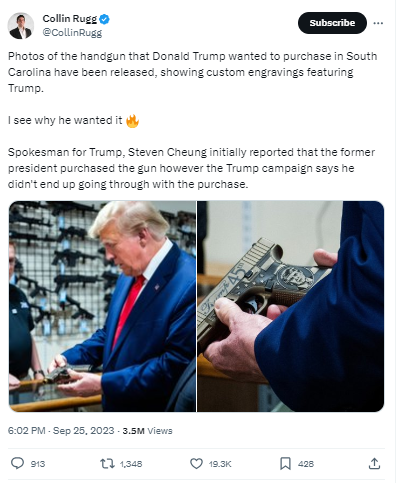On Friday, the office of Special Counsel Jack Smith put forth an argument that former President Donald Trump might have breached his release conditions by buying a firearm. Trump’s representative denies any such purchase.
The Associated Press reported that on September 25, Trump’s spokesperson, Steven Cheung, tweeted that Trump had bought a gun in South Carolina but later retracted his statement and removed the tweet. In a court document filed on Friday evening, prosecutors mentioned that Trump “possibly” infringed upon his release terms, referencing a federal statute that prohibits individuals under indictment for a crime with a punishment exceeding one year in prison from obtaining a firearm.
In a footnote, the prosecutors stated, “The defendant either procured a gun in defiance of the law and his release conditions or aims to gain from his supporters’ erroneous belief that he did. They stated that purchasing a firearm while under indictment for a felony would be a separate federal crime and a violation of the defendant’s conditions of release.
A Trump spokesperson later clarified that although the former president intended to buy a gun, he did not actually proceed with the purchase. Despite expressing a wish to own the gun, Trump was not observed completing any paperwork for the acquisition, as per The Post and Courier.
In his document, Smith highlighted that Trump shared a video of the event posted by a follower even after his spokesperson deleted his tweet.
Research director David Kopel of the Independence Institute informed Check Your Fact that some federal courts have deemed the law unconstitutional. Last year, a federal judge in Texas declared it unconstitutional. The Fifth Circuit is currently reviewing the case. “Nonetheless, the law is still effective as of now.”
Images of the handgun that Donald Trump wished to buy in South Carolina have been disclosed, showcasing custom engravings featuring Trump.

Screenshot: X: Collin Rugg
Smith’s remarks were part of a court document supporting his earlier plea for a “limited” gag order to prevent Trump from making “derogatory and inflammatory or threatening” remarks about individuals, witnesses, court staff, and potential jurors involved in his 2020 election case.
Smith’s office argued that the defendant should not be permitted to enjoy the advantages of his provocative public statements and then refuse accountability by having others retract their statements, which he knows will receive considerably less attention than his own. The footnote cited the gun incident as an example. They also argue that no other criminal defendant would be allowed to publicly suggest that a known witness in their case should face execution, and this defendant should not be allowed to do so either.
In a document filed on Tuesday, Trump’s attorneys criticized the request as a political maneuver by the Biden administration to mute “the prime contender in the 2024 Presidential Election.”
Trump’s lawyers appealed to U.S. District Judge Tanya Chutkan to dismiss Smith’s plea, claiming the attempt was an unconstitutional attempt to censor Trump.
However, on Friday, prosecutors argued that Trump should not receive “special treatment.”
On Friday, Smith’s team contended that in the defendant’s rebuttal—based on “inapplicable caselaw and false claims”—he seeks special treatment, claiming that by being a political candidate, he should be allowed to publicly threaten witnesses and disparage the Court, the citizens of this District. According to the prosecutors, “But in this scenario, Donald J. Trump is a criminal defendant like any other.”